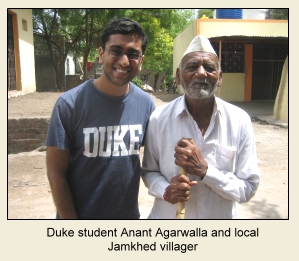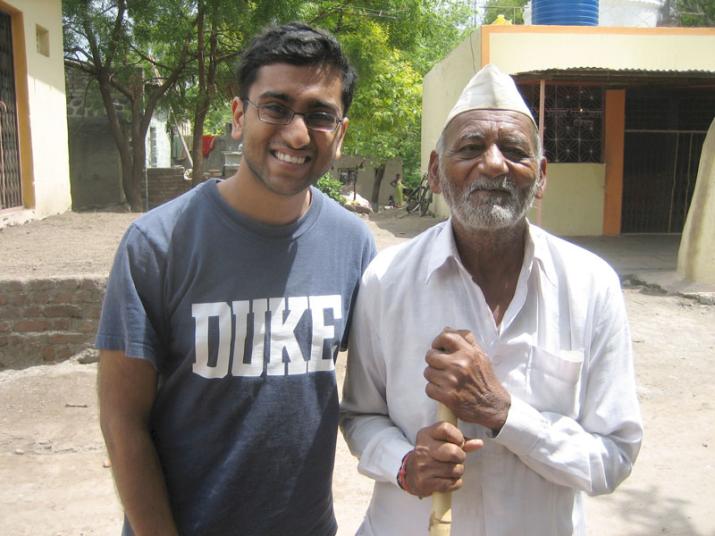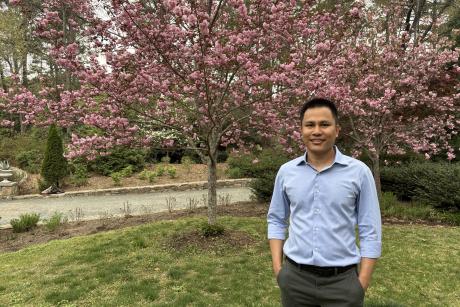Duke Senior Anant Agarwalla is convinced there are infinite possibilities of a bottom-up approach to improve the health of villagers in rural communities. He completed a summer fieldwork project, funded by the Duke Global Health Institute, in the heart of Maharashtra, India where he assessed the work of the Jamkhed Comprehensive Rural Health Project (CRHP). The 20-year-old has worked in impoverished communities in the past, and says he was drawn to CRHP for its sustainable, comprehensive model of community empowerment, especially among the poor and marginalized.

“CRHP has been so successful and innovative, and I really wanted to get a chance to learn from some of these remarkable people,” says Agarwalla, an economics major and global health advocate who plans to attend medical school. “They have done a spectacular job addressing some of the most common nonmedical determinants of disease.”
The Jamkhed model examines the root causes of disease by focusing on poverty reduction, nutrition, sanitation, education and social equality. For nearly 40 years, the project has impacted hundreds of thousands of people in rural Maharashtra, which is several hundred miles east of Mumbai. Its success is evident by the health challenges that exist in Jamkhed, which are largely related to sanitation and non-communicable chronic diseases like diabetes and hypertension.
“That’s just unbelievable in a rural village in India where people do not have access to a hospital, and is heavily affected by drought, child malnutrition, tuberculosis, leprosy and malaria,” says Agarwalla.
An essential part of CRHP is the training and empowerment of locals to become village health workers – many of whom are women - who provide basic health services and support to their community. Agarwalla recalls the story of a teenage girl who was abandoned by her husband after she lost her child due to complications. He says it was not until CRHP came along to train the young woman as a village health worker that she believed she could make a worthwhile contribution to her community.
As Agarwalla became more acquainted with the community-based health model and the people it serves, he began his project assessing infant mortality data that was collected by village health workers over the years. To date, there has not been a thorough analysis of this data to determine the effectiveness of the project’s data collection method.

“I was under the impression that we would be looking at their notebooks and just copying down all the deaths and births,” says Agarwalla. “The problem is the records are dispersed across several different books, all of which are falling apart. Even though we’re starting in 1992, they didn’t really focus on having accurate data until more recently.”
Agarwalla worked with Jamkhed staff to compile 15 years of data and finalize a coding system that could be used in the future.
Although CRHP is regarded as a model for its efforts to integrate health and community development, Agarwalla learned there are some challenges to overcome. CRHP project leaders have not been able to expand the program beyond its current borders in Jamkhed due to limited resources. One critical resource is a trained doctor. “CRHP has had a hard time finding anyone that is willing to spend enough time here to learn about rural health problems and then actually work on them,” says Agarwalla. “The model does not depend on having many doctors, but I don’t really see what CRHP can do to continue.”
The silver lining may lie in students like Agarwalla, who plans to pursue a career in medicine and whose primary interest is global health. “I have a particularly strong interest in South Asia,” says Agarwalla, who speaks fluent Hindi. “As a person of Indian origin myself, I do feel a certain tie to the subcontinent.”
In addition to his work in Maharashtra, Agarwalla has also developed a microfinance project for the transgender population in New Delhi through the DukeEngage program. Agarwalla says it is these life experiences outside of the classroom that help him to truly make sense of the vast health care dilemmas that the underprivileged face in developing nations.



